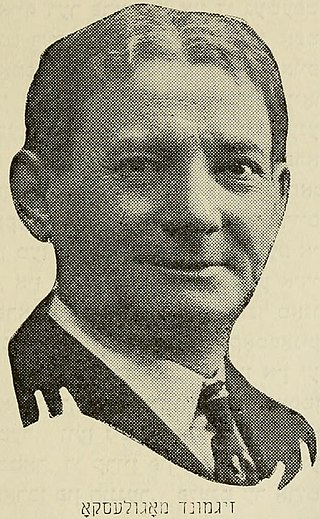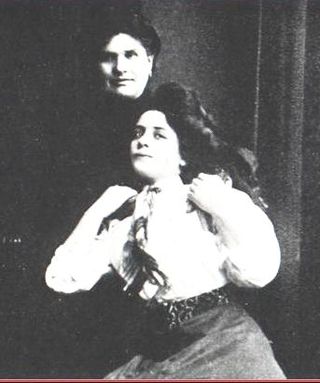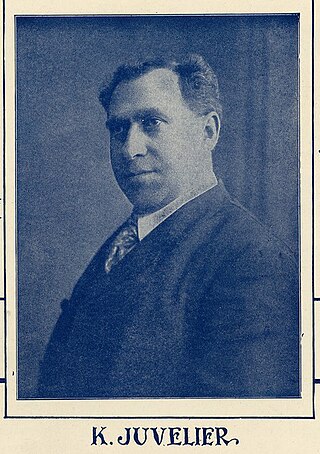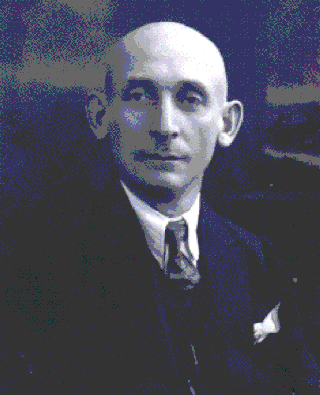Related Research Articles
Yiddish theatre consists of plays written and performed primarily by Jews in Yiddish, the language of the Ashkenazi Jewish community. The range of Yiddish theatre is broad: operetta, musical comedy, and satiric or nostalgic revues; melodrama; naturalist drama; expressionist and modernist plays. At its height, its geographical scope was comparably broad: from the late 19th century until just before World War II, professional Yiddish theatre could be found throughout the heavily Jewish areas of Eastern and East Central Europe, but also in Berlin, London, Paris, Buenos Aires and New York City.
The Broderzinger or Broder singers, from Brody in Ukraine, were Jewish itinerant performers in Austrian Galicia, Romania, and Russia, professional or semiprofessional songwriters and performers, who from at least the early 19th century sang and danced, often in comic disguises, and who performed short one-act plays. They were often badchonim and meshorerim. They were among the first to publicly perform Yiddish-language songs outside of Purim plays and wedding parties, and were an important precursor to Yiddish theatre. They erected miniature stages and entertained customers in taverns, wine cellars, and restaurant gardens.
Berl Broder (1817–1868), born Berl Margulis, was a Ukrainian Jew born in Podkamen, the most famous of the Broder singers and reputed the first to be both a singer and an actor. His nickname is the origin of the term Broder singer. Thirty of his songs survive; of these, 24 are in the form of dialogues, usually between craftsmen such as tailors or shoemakers; his songs are seen as a precursor to Yiddish theater.

Sigmund Mogulesko — Yiddish: זעליק מאָגולעסקאָZelik Mogulesko, first name also sometimes spelled as Zigmund, Siegmund, Zelig, or Selig, last name sometimes spelled Mogulescu — was a singer, actor, and composer in the Yiddish theater in New York City. He was born in Kalarash, Bessarabia and began singing in the local synagogue choir. Before reaching adolescence, he was paid nearly three times what teachers made, to sing in the synagogue of Chişinău. Soon after moving to Bucharest, Romania, he was paid to sing in churches as well as synagogues, and started acting.

Jacob Michailovitch Gordin was a Russian-American playwright active in the early years of Yiddish theater. He is known for introducing realism and naturalism into Yiddish theater.

Yankev Shternberg was a Yiddish theater director, teacher of theater, playwright, avant-garde poet and short-story writer, best known for his theater work in Romania between the two world wars.

David Kessler (1860–1920) was a prominent actor in the first great era of Yiddish theater. As a star Yiddish dramatic performer in New York City, he was the first leading man in Yiddish theater to dispense with incidental music.

Herman Wohl was a Jewish–American composer closely associated with the American Yiddish Theatre.
Henech Kon or Henryk Kon was a Polish composer and cabaret performer.

Arnold Perlmutter was a composer for Yiddish theatre, born in Zolochiv, Galicia, Austria-Hungary. He moved to Lemberg where he received both a religious and a secular education in Polish, Ukrainian, and German. He sang with then-famous hazzan Borekh Shor's chorus until his voice changed, then became a klezmer, playing bass and then violin and directing and composing for the Harmonia orchestra, which in 1889 was taken into I. B. Gimpel's Yiddish theater in Lemberg; he wrote the music for the operetta Rabbi Akiva and his students. and Der Spanisher Tsigayner .

Clara Young was a Yiddish theatrical actor. Born to parents who loved the stage, she spent her early years in a home that housed rehearsals of traveling Yiddish theater troupes. After her father's death, the family went to America, where she soon joined the Tantsman company and went to Boston, there to Zolotarevski's troupe in Montreal, thence to Toronto and to Morris Finkel's theater in Philadelphia.

Boaz Yungvits (Youngwitz), aka Bernard Young was a Polish actor.

Aaron Lebedeff (1873–1960) was a Yiddish theatre star, born in Gomel, Belarus.
Israel "Iso" Szajewicz (1910–1941) was a Polish-Jewish composer and conductor born in Kutno, Poland. His parents, Dineh and Józef Szajewicz, were Yiddish actors, on the road with a wandering Jewish theatre troupe. He was raised by his step-father, the actor Avrom Kurtz. He worked as a hairdresser and taught himself music in his young years.
Kasriel Broydo (1907–1945) was a Lithuanian songwriter, singer and coupletist. He was born in Vilnius and played in various troupes and marionette-theaters. His lyrics and songs, like Hot zikh a zun aza breyte tseshpreytn, were the folk songs of his place and time.

Pepi Litman was a cross-dressing female Yiddish vaudeville singer associated with the Broderzinger movement. Litman led a popular traveling theater troupe around Europe, performing highly satirical songs while costumed as a male Hasidic Jew. Because she frequently performed while costumed as a young boy or as a male dandy, she is considered a proto-drag king performer. Pepi Litman made numerous 78rpm recordings which capture her energetic and virtuosic singing style, and which also stand as a document of Jewish life in Eastern Europe.

Kalman Juvelier was an Austrian-born Yiddish theatre actor and manager, Broder singer, Tenor, and recording artist of the late nineteenth and early twentieth centuries, who was active both in Europe and the United States. After emigrating to the United States in 1900, he became a key figure in the Yiddish theatre in New York, working with such notables as Boris Thomashefsky, David Kessler, Bertha Kalich and Jacob P. Adler and was director of the Hebrew Actor's Union as well as the Jewish Theatrical Alliance. From roughly 1905 to 1918, he recorded roughly 90 Yiddish language discs, mostly Yiddish theatre music, for most of the major record labels in the New York area.

Joseph Brody was an American Jewish composer who wrote for the Yiddish theatre as well as liturgical Jewish works. He taught George Gershwin and was a friend of Yossele Rosenblatt. His daughter, Estelle Brody, was an actress.

Anshel Schorr, also known by the anglicized name Albert Schorr, was an Austrian-born American playwright, lyricist, theater manager and composer active in the Yiddish Theatre of the early twentieth century. He worked with many of the famous figures of that era including Joseph Rumshinsky, Arnold Perlmutter, Molly Picon, Jacob P. Adler, and David Kessler, and wrote or co-wrote more than fifty plays and operettas which were widely performed in Europe and the Americas. His songs were recorded by contemporary artists such as Pepi Litman, Pesach Burstein, Mordechai Hershman and Simon Paskal. His wife, Dora Weissman, was also a well-known Yiddish theatre actor.

Oscar Zehngut was an Austro-Hungarian violinist, Yiddish theatre arranger and recording artist. He was one of a handful of violinists to record klezmer music in Europe before World War I, as well as a number of discs where he accompanies Yiddish theatre singers.
References
- ↑ http://www.yivoencyclopedia.org/printarticle.aspx?id=2195 YIVO encyclopedia
- 1 2 3 4 5 6 Zalmen Zylbercweig, Leksikon fun Yidishn teater, Book three, 1873-1875
- 1 2 Fater, Isaschar (1970). Yidishe muzik in Poyln tsvishn beyde velt-milkhomes (Jewish Music in Poland between the Two World Wars), pp. 340-342.
- ↑ http://www.zchor.org/bialystok/yizkor3.htm#theater Bialystok yizkor remembrance